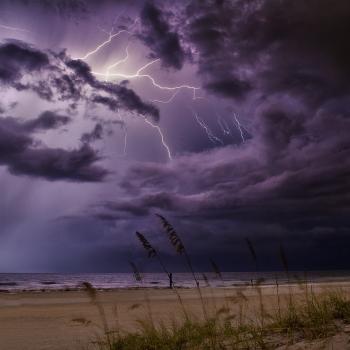
My heart breaks when I read the beginning of the story of Saul in 1 Samuel. Saul experiences a tragedy-filled life because God’s people have decided they want an earthly king. He reigned over a kingdom torn apart by the competing desire to rule as king and submit to God as the true King. It is a stark warning that Christians in America would do well to contemplate.
The Search for a King
At first, Saul did not want to be king. He disappeared during the process of choosing the king. He was hiding, hoping nobody would notice him. It didn’t help that he was the tallest person in the kingdom. Saul looked like a king. He was tall, and he was a warrior. Looking at his outward appearance, he was the perfect candidate.
Unfortunately, his heart was not ready for the challenge of being king. Saul did not trust in God’s anointing. From the first moment when it looked like people would desert him, he broke God’s law. While waiting on the prophet Samuel to come and perform a sacrifice to God, people started to get impatient. Saul feared that the people would leave and no one would be left to fight the battle. So he took it upon himself to perform the sacrifice. When Samuel arrived, he carried a word of condemnation from God rather than a blessing.
Then Saul betrayed God by keeping all the livestock after a victory. Saul tried to explain he kept them only to sacrifice to God, but when confronted, he admitted he was afraid the people would rebel if he destroyed the livestock. Because he feared losing his kingdom, he disobeyed God. David appeared on the scene, and the people cheered his success in battle. Saul saw David only as a threat to the throne and pursued him intently, hoping to kill him. In the end, Saul was terrified and saw threats to his power in every shadow.
Submitting to God
Few leaders have the outlook on power and authority that David demonstrates. David was not perfect and made significant mistakes. However, he understood where the ability to have control and rule genuinely came from. God provided several moments where David could have chosen to kill Saul. David had every opportunity to end Saul’s life and take the throne. But David declined to harm God’s anointed and chosen leader each time. God anointed David as the next king when David was a young boy, but David was content to wait until God moved and ended Saul’s reign. David relied on God to elevate him to the throne.
As king, David danced in the streets to celebrate the ark’s return. He danced for God and didn’t care what people thought. He was not riddled with worry that people would take away his rule because he knew God was the ultimate authority. Then later in David’s life, his son rebelled against him in a bid to take the throne. David refused to fight. Instead, he relied upon God to restore him to the throne. Even if God hadn’t, David would have been content to follow God and allow his son to rule. David was pleased to allow God to work out the details and timing of his rule.
Holding on with the Strong Right Hand
Christians in America must study to understand the culture as it changes and shifts. Most experts agree that we are moving to (if we have not already arrived) a post-Christian world. Conservatives, especially those considered far right, seem posed to try and keep their authority and rule by any means. For many years, the “moral majority” has enjoyed being influential in politics and catered to by political parties. But the further we sink into partisan culture wars. I find it harder to support the synonymous use of conservative and Christian. I hold conservatives to a high standard because many claim to be Jesus’ followers. But politics have become more about having the right sound clips and staying elected than changing the world for the better of all people. And like Saul, conservatives often justify the extreme means to hold onto power.
Just this month, two examples unsettled me.
The Tennessee Three
First, two elected officials were removed on conservative partisan lines in Tennessee. That a predominantly white majority removed two black representatives is very troubling. But even more, I see the same grasping for power that Saul suffered repeatedly. The two young men didn’t respect the authority of the majority (they dared lead a protest related to the recent shooting at a Christian school). So the conservative majority responded in such a way as to use fear to keep people in line. The harder those in power try to hold onto power, the quicker it slips through the grasping hand.
Texas Justice?
Secondly, the governor of Texas has declared he will pardon a man who was convicted in the shooting death of a protestor. I wasn’t in the courtroom, but for that matter, neither was the governor. The push to pardon comes before any appeals have been offered and before any other court or authority has looked into the trial. He may deserve a pardon, or he may not, but to declare that he does only based on what appears to be solely conservative party lines is a dangerous precedent.
And it does not pass the test of asking, “If it was the other political party doing this, would I be ok with it?” When politicians seek to please men with little consideration of a God who calls us to seek justice, love mercy, and walk with Him humbly, we must be clear that it is unacceptable. And not just for the other party; it is intolerable for either party and any politician who takes similar actions, whether or not he is “our” guy or girl.
Power to Change Hearts
The current climate makes people who disagree with you politically your enemy. And the discourse continues to drive a gap so that we rationalize avoiding people who disagree with us. We buy into the narrative that those people are lazy, evil, dumb, or too blind to wake up to the truth. We make snide and cynical “jokes,” content that at least “we” have it all figured out.
But what would Jesus say and do? He broke cultural norms and smashed through separating walls so much that the Pharisees regarded him as a drunkard at best or demon possessed at worst. Jesus often had the harshest message for those in power and those causing the people to carry the heaviest burden. The truth remains that governments, political parties, and politicians will come and go. But Gospel and the great commission to carry that good news to our neighbors and the whole world remains.
Having good civil governments and righteous laws is not a bad thing. But laws don’t change hearts and bring forth new creations. Only God does that. So, if your time and energy are consumed with worry, anger, and even rage about what politicians are doing, what will you have left to carry out the great commission? What good is it for a man, or political party, to gain the whole world but lose their soul? What have you done more this past year, consumed (watch, read, browsed online) media about politics or the “state” of the country, or shared the Gospel with someone?
Seek First the Kingdom of Heaven
Maybe God has called you to a life of politics and public service; this is not an article disputing that. We need Godly people in every sphere of the world and every profession. But I do intend to remind us all that power seduces us to fight to keep it by any means possible. I pray that, as a nation, we would turn off the experts and the inflammatory segments and seek the Kingdom of God first. God is always at work and may bring about a spiritual revival that includes the political realm. He may not include it at all.
But I do know for sure that we are called to be salt and light to a dark and dying world. We should not let any barrier or idealistic difference stand in our way of loving our neighbors (especially our enemies). We should be sensitive and aware of when God created a divine appointment for us to share who Jesus was, is, and will be. If the mask of politics and the insidious seduction of power gets in the way, we should let them drop to the side and be hindered no more. Like David, we should trust in God and allow for the time and space for God to accomplish what He will do. Our power, which is not of this world, comes when we submit to God, and that power can change hearts.

















